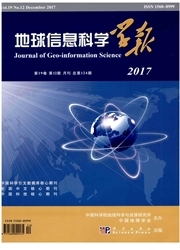

 中文摘要:
中文摘要:
电子地图数据是各种智能交通系统的基础数据,对方便人们交通出行、解决城市交通拥堵问题具有重要的意义。其中,道路网络数据又是电子地图的重要组成部分。传统的道路网络数据更新方法往往需要耗费大量人力物力,因此,从其他数据源中如遥感影像数据、LIDAR数据等提取道路网络的相关研究,已成为国内外的研究重点。车载定位设备的广泛应用使车辆轨迹数据的大量获取成为可能,轨迹数据是对车辆行驶路径的完整记录,同时也是道路网络几何特征的直接反映。当轨迹数据量足够大时,则可利用其构建路网,用于更新或修正现有地图上的路网空间信息。针对车辆轨迹数据的特点和道路网络的特性,本文提出一种细化的道路网络几何特征提取方法。车辆轨迹数据是矢量数据,将其转换为栅格数据后,就可采用图像细化的方法处理。图像细化可以在保持原图像拓扑结构不变的情况下,快速地提取出图像的中心像元,并且有效去除冗余信息。本文以上海陆家嘴的车辆轨迹数据为例进行了实验,结果表明,利用车辆轨迹数据构建路网不仅可行,而且简单、高效,取得了良好的效果。
 英文摘要:
英文摘要:
Electronic map data is of enormous importance for analyses of travel, urban congestion, etc. It is growing an important basic data of transportation research and widely employed in vehicle navigation system and intelligent transportation system. Of electronic map data, road network data is a fundamental part and often updated. As a result of a lot of expense of manpower and resources of traditional method, more and more research efforts have been made on extracting geometrical characteristics of road network from other data resources like LIDAR data. The wide use of mobile positioning devices makes it possible to obtain a large volume of vehicle trajectory data within a short period. These data are complete records of vehicles" movement and able to reflect geometrical characteristics of road network as well. By this means, vehicle trajectory data can be employed to figure out changes happening to the spatial extent of road networks as long as enough data are available, and then we can update the road network database. Since traiectory data integrate both spatial and temporal information and their volume is often huge, it is not straightforward to realize the aforementioned target. In view of this, the paper proposes a thinning-- algorithm--based method to construct road network. Vehicle trajectory data are vector data, are first con- verted to raster data, then thinning method can be used to extract geometrical characteristics of road net- work. With this method, center lines of road networks can be extracted, network topology be maintained, and meanwhile redundant information be removed. A case study in Lujiazui, Shanghai with taxi trajectory data is conducted and the results are evaluated.
 同期刊论文项目
同期刊论文项目
 同项目期刊论文
同项目期刊论文
 期刊信息
期刊信息
